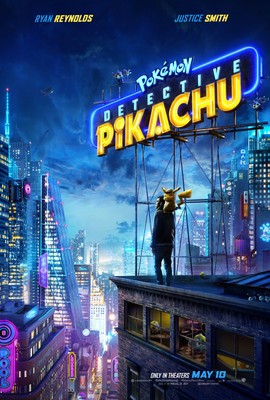News
Detective Conan Film Returns to #1, Detective Pikachu Opens at #3
posted on by Rafael Antonio Pineda
 Meitantei Conan: Konjō no Fist (Detective Conan: Fist of Blue Sapphire), the 23rd Detective Conan anime film, dropped to #2 in its third weekend, but went back to #1 in its fourth weekend. The film sold 448,000 tickets and earned 587,101,500 yen (about US$5.32 million) in its fourth weekend, and has earned a cumulative total of 7,271,440,500 yen (about US$68 million).
Meitantei Conan: Konjō no Fist (Detective Conan: Fist of Blue Sapphire), the 23rd Detective Conan anime film, dropped to #2 in its third weekend, but went back to #1 in its fourth weekend. The film sold 448,000 tickets and earned 587,101,500 yen (about US$5.32 million) in its fourth weekend, and has earned a cumulative total of 7,271,440,500 yen (about US$68 million).
The film sold 1,458,263 tickets to earn 1,886,292,700 yen (about US$16.85 million) in its first three days. The film also debuted at #1 at the Japanese box office for the weekend of April 13-14.
The opening weekend earnings surpassed last year's film, Detective Conan: Zero the Enforcer. That earlier film sold 1,289,000 tickets in its first three days in April 2018 to earn 1.67 billion yen (about US$15.6 million). The 2018 movie is the highest-earning film in the franchise. In Japan, the film has earned 9.18 billion yen (about US$82 million), and is the eighth highest-grossing anime film in Japan of all time, and the 46th highest-grossing film in Japan in general. As of November 16, the film had earned 11 billion yen worldwide.
Detective Conan: Fist of Blue Sapphire is set in Singapore, and is the first Detective Conan film set outside of Japan. Singapore's famous Marina Bay Sands is the site of a murder case in the film. The plot involves a large gem known as the "Blue Sapphire," which sank to the bottom of the ocean at the end of the 19th century. The film centers on Kaitō Kid, Makoto Kyōgoku, and Conan Edogawa. Makoto, an undefeated karate master with 400 wins, confronts Kid as Kid tries to steal the Blue Sapphire. Meanwhile, Kaitō Kid brings Conan to Singapore against his will.
Tomoka Nagaoka (assistant director on Detective Conan: The Crimson Love Letter) directed the film. Takahiro Ōkura (Detective Conan: The Crimson Love Letter) penned the script. Katsuo Ono returned to compose the music. Hiroomi Tosaka, the vocalist for Sandaime J Soul Brothers from Exile Tribe, performed the film's theme song "Blue Sapphire."
 Legendary Entertainment and Warner Bros.' live-action Pokémon Detective Pikachu film opened in Japan on May 3, and ranked #3 in its opening weekend. It sold 676,000 tickets and earned 948 million yen (about US$8.60 million) over the four-day weekend (both Friday and Monday were part of the Golden Week holidays in Japan), with 317,000 of the tickets and 533 million yen (about US$4.83 million) of the earnings accrued over Saturday and Sunday.
Legendary Entertainment and Warner Bros.' live-action Pokémon Detective Pikachu film opened in Japan on May 3, and ranked #3 in its opening weekend. It sold 676,000 tickets and earned 948 million yen (about US$8.60 million) over the four-day weekend (both Friday and Monday were part of the Golden Week holidays in Japan), with 317,000 of the tickets and 533 million yen (about US$4.83 million) of the earnings accrued over Saturday and Sunday.
The film will debut in the United States on May 10.
Ryan Reynolds (Deadpool) plays Detective Pikachu. Justice Smith (The Get Down) stars as main character Tim Goodman, a teen who teams with Pikachu in order to find his missing father, and Kathryn Newton (Big Little Lies) plays the "sassy journalist" Lucy. Ken Watanabe (Legendary's Godzilla) plays original character Detective Yoshida. The cast also includes Bill Nighy (Pirates of the Caribbean: Dead Man's Chest, Love Actually), Chris Geere (You're the Worst), Suki Waterhouse (Assassination Nation), Rita Ora (Fifty Shades Freed), and Omar Chaparro (Stuck, Overboard 2018). In the Japanese dub, Ryōma Takeuchi will play protagonist Tim Goodman, while Marie Iitoyo plays Lucy.
Rob Letterman (Shark Tale, Monsters vs. Aliens, Goosebumps) directed the film, with scripts by Nicole Perlman (Guardians of the Galaxy) and Letterman. The film started production in London in mid-January 2018. Warner Bros. is distributing the film in North America, and TOHO is distributing the film in Japan. A sequel has reportedly already been greenlit.
 The live-action film of Yasuhisa Hara's Kingdom manga dropped from #2 to #3 in its second weekend, and from #3 to #4 in its third weekend. The film earned 435,562,500 yen from last Friday to Sunday, and has earned a cumulative total of 3,344,160,200 yen (about US$30.35 million), and sold a cumulative total of 2.67 million tickets.
The live-action film of Yasuhisa Hara's Kingdom manga dropped from #2 to #3 in its second weekend, and from #3 to #4 in its third weekend. The film earned 435,562,500 yen from last Friday to Sunday, and has earned a cumulative total of 3,344,160,200 yen (about US$30.35 million), and sold a cumulative total of 2.67 million tickets.
The film sold 506,861 tickets to earn 690,219,500 yen (about US$6.17 million) in its first three days from Friday through Sunday. The film ranked at #2 in its first Saturday-Sunday weekend. TOHO is aiming for the film to earn 4 billion yen (about US$35.7 million).
Shinsuke Satō (live-action Gantz, Death Note Light up the NEW world, Bleach) directed the film. Sony Pictures Japan produced the film. ONE OK ROCK performed the theme song "Wasted Nights" for the film.
Kento Yamazaki reprised his role as protagonist Shin (Xin) from the manga's earlier live-action short.
Hara's historical manga centers around the slave boy Xin and his dream of becoming a great general for the state of Qin. Xin helps Ying Zheng, the young Qin king who shares his desire to unify China, rise to power within the state. Xin does all he can to become a superior commander of an army capable of defeating the Seven Warring States.
 Eiga Crayon Shin-chan Shinkon Ryokō Hurricane ~Ushinawareta Hiroshi~ (Crayon Shin-chan the Movie: Honeymoon Hurricane, Lost Hiroshi), the series' 27th film, dropped from #3 to #4 in its second weekend, and dropped to #5 in its third weekend. The film earned 192,387,700 yen (about US$1.74 million) from last Friday to Sunday, and sold a cumulative total of 1.4 million tickets for a cumulative total of 1,540,750,800 yen (about US$13.99 million).
Eiga Crayon Shin-chan Shinkon Ryokō Hurricane ~Ushinawareta Hiroshi~ (Crayon Shin-chan the Movie: Honeymoon Hurricane, Lost Hiroshi), the series' 27th film, dropped from #3 to #4 in its second weekend, and dropped to #5 in its third weekend. The film earned 192,387,700 yen (about US$1.74 million) from last Friday to Sunday, and sold a cumulative total of 1.4 million tickets for a cumulative total of 1,540,750,800 yen (about US$13.99 million).
The film sold 242,000 tickets and earned 289 million yen (about US$2.58 million) to rank at #3 in its opening weekend. The film earned 78.7% of the opening weekend earnings of the previous year's franchise film. The film opened in Japan on April 19.
The anime is set in Australia and follows the Nohara family on an inexpensive and family-friendly honeymoon trip that Misae discovered. Instead of the romantic trip they envisioned, Misae, Hiroshi, and their children get wrapped up in a dangerous adventure. Hiroshi is the center of the story and becomes the key to a treasure. Hiroshi is taken away soon after the family's arrival in Australia. The remaining family members must rescue him while dealing with a mysterious masked group and treasure hunters.
The film is Yumiko Kobayashi's first for the franchise in the title role. She took over the role of protagonist Shinnosuke Nohara in the television anime last July after previous voice actress Akiko Yajima departed from the role.
Masakazu Hashimoto, who directed three previous Crayon Shin-chan films, returned to direct the film. Kimiko Ueno also returned to write the script with Munenori Mizuno (Doraemon, Midnight Crazy Trail). Shinei Animation, TV Asahi, ADK, and Futabasha are credited for production.
 The live-action film adaptation of Homura Kawamoto and Tōru Naomura's Kakegurui - Compulsive Gambler manga opened in Japan on May 3, and ranked at #6 in its opening weekend.
The live-action film adaptation of Homura Kawamoto and Tōru Naomura's Kakegurui - Compulsive Gambler manga opened in Japan on May 3, and ranked at #6 in its opening weekend.
Original creator Kawamoto collaborated on the film's original story. A separate live-action television series premiered on March 31.
The main cast members in the film reprised their roles for the second season of the series. Sayuri Matsumura joined the cast Yumemi Yumemite and Elaiza Ikeda played Kirari Momobari. PassCode performed the film's opening theme song "Ichi ka Bachi ka" (All or Nothing).
The first 10-episode show premiered in Japan in January 2018. Tsutomu Hanabusa (Heroine Shikkaku, Asahinagu) directed the series. Netflix is streaming the series outside of Japan.
Homura Kawamoto and Tōru Naomura's Kakegurui - Compulsive Gambler manga launched in Square Enix's Gangan Joker magazine in March 2014. Yen Press licensed the manga and describes the story:
Hyakkaou Private Academy. An institution for the privileged with a very peculiar curriculum. You see, when you're the sons and daughters of the wealthiest of the wealthy, it's not athletic prowess or book smarts that keep you ahead. It's reading your opponent, the art of the deal. What better way to hone those skills than with a rigorous curriculum of gambling? At Hyakkaou Private Academy, the winners live like kings, and the losers are put through the wringer. But when Yumeko Jabami enrolls, she's gonna teach these kids what a high roller really looks like!
The manga inspired a television anime series that ran from July to September 2017 in Japan. The series premiered outside of Japan on Netflix in February 2018. The anime's second season premiered on January 8.
 The live-action film adaptation of Mineo Maya's Tonde Saitama (Fly Me to Saitama) manga went back up from #7 to #6 in its 10th weekend, and dropped to #8 in its 11th weekend. The film earned 34,137,900 yen (about US$309,900) from last Friday to Sunday, and has earned a cumulative total of 3,644,340,800 yen (about US$33.08 million).
The live-action film adaptation of Mineo Maya's Tonde Saitama (Fly Me to Saitama) manga went back up from #7 to #6 in its 10th weekend, and dropped to #8 in its 11th weekend. The film earned 34,137,900 yen (about US$309,900) from last Friday to Sunday, and has earned a cumulative total of 3,644,340,800 yen (about US$33.08 million).
After opening on February 22, the film sold 191,000 tickets for 259,038,800 yen (about US$2.33 million) on Saturday and Sunday to top the Japanese box office in its opening weekend.
Hideki Takeuchi (live-action Nodame Cantabile, Thermae Romae) directed the film, and Tomokazu Tokunaga (live-action Densha Otoko) wrote the script. Hanawa performed the film's theme song "Saitama-ken no Uta" (The Song of Saitama Prefecture).
There are two parts to the film: a "legend part" that focuses on Rei and Momomi, and a "modern part" that focuses on a certain Saitama family through whom the legend is told. In the story, those who live in Saitama Prefecture are ruthlessly persecuted by those who live in Tokyo, so the citizens of Saitama Prefecture hide this fact from others. High school student Momomi Dannoura is the son of the governor of Tokyo, and he is also the student council president at Hokuhodo Academy, the top high school in Tokyo. One day, he meets Rei Asami, a mysterious transfer student who has returned from America. Rei and Momomi are captivated by each other, but Momomi knows Rei is from Saitama Prefecture. The manga tells the story of two people split by a prefectural border, a Saitama "Romeo and Juliet." The couple try to elope and start a revolution to liberate Saitama Prefecture.
 The fourth film in the theatrical anime version of the King of Prism: Shiny Seven Stars anime project opened on May 4. The film ranked at #9 in its opening weekend.
The fourth film in the theatrical anime version of the King of Prism: Shiny Seven Stars anime project opened on May 4. The film ranked at #9 in its opening weekend.
The project is both a theatrical anime and television anime series. The television anime will have 12 episodes, and the theatrical version has four parts, each screening an edited version of three episodes of the television anime.
The first of the four films opened on March 2. The second film opened on March 23. The third film will open on April 13. The television anime premiered on TV Tokyo and TV Aichi on April 8 at 25:35 (effectively 1:35 a.m. on April 9). The series also airs on TV Osaka and BS-TV Tokyo.
According to Mainichi Shimbun's Mantan Web, as of April 9, the project's first two anime films collectively have earned more than 200 million yen and have sold more than 130,000 tickets.
The first film, a prologue, features the characters Yukinojō and Taiga; the second film features Kakeru, George, and Minato; the third film features Leo, Yū, and Alex; and the fourth film features Lou, Shin, and an unknown character.
Masakazu Hishida returned from both KING OF PRISM by PrettyRhythm and King of Prism: PRIDE the HERO to direct the anime at Tatsunoko Pro, and Jou Aoba returned to handle the series composition. PriPara's Shōji Hara designed the characters, and Mai Matsuura also returned from both films and was in charge of the original character designs. Rei Ishizuka returned from King of Prism: PRIDE the HERO to compose the music.
 Eiga Doraemon no Nobita no Getsumen Tansaki (Doraemon the Movie: Chronicle of the Moon Exploration), the Doraemon franchise's 39th film, dropped from #6 to #9 in its ninth weekend, and to #10 in its 10th weekend. The film earned 27,888,400 yen (about US$253,100) from last Friday to Sunday, and has earned a cumulative total of 4,930,696,900 yen (about US$44.75 million).
Eiga Doraemon no Nobita no Getsumen Tansaki (Doraemon the Movie: Chronicle of the Moon Exploration), the Doraemon franchise's 39th film, dropped from #6 to #9 in its ninth weekend, and to #10 in its 10th weekend. The film earned 27,888,400 yen (about US$253,100) from last Friday to Sunday, and has earned a cumulative total of 4,930,696,900 yen (about US$44.75 million).
The film stayed at #1 for six consecutive weeks, and is the first film in the current film series to do so since the film series began in 2004.
The film opened on 382 screens on March 1 and sold 645,000 tickets for 757 million yen (about US$6.77 million) to top the Japanese box office in its opening weekend. From March 2-3, the film earned 82.6% of the earnings from last year's Eiga Doraemon: Nobita no Takarajima film in its opening weekend. Eiga Doraemon: Nobita no Takarajima holds the record as the highest-grossing film in the current 14-installment Doraemon film series after earning a total of 5.37 billion yen (about US$48.1 million) at the box office. Each Doraemon film in the past three years has set a new franchise box-office record.
The film's story relates to the Japanese folkloric belief that a rabbit resides on the moon. The film is set on the moon and centers on strong friendships bound together by the "ability to believe." Luna is a mysterious girl who lives on the far side of the moon. Diabolo and his subordinate Goddard stand in the way of Nobita and his friends on their moon exploration journey.
Shinnosuke Yakuwa (Doraemon the Movie: Nobita and the Birth of Japan 2016, Doraemon the Movie: Nobita in the New Haunts of Evil - Peko and the Five Explore) directed the film, which is his first work directing from an original script. Naoki Prize-winning mystery author Midzuki Tsujimura (Tsunagu, Kagami no Kojō) wrote the script, and she also wrote a novel adaptation, which debuted on November 16. Dai Hirai performed the theme song "The Gift."
 Kyoto Animation's Gekijōban Hibike! Euphonium: Chikai no Finale (Sound! Euphonium The Movie: Oath's Finale), the second of two planned new films in the Sound! Euphonium franchise, dropped from #5 to #8 in its second weekend, and dropped off the top 10 in its third weekend. The film earned 26,945,100 yen (about US$244,500) from last Friday to Sunday, and has earned a cumulative total of 256,939,800 yen (about US$2.33 million).
Kyoto Animation's Gekijōban Hibike! Euphonium: Chikai no Finale (Sound! Euphonium The Movie: Oath's Finale), the second of two planned new films in the Sound! Euphonium franchise, dropped from #5 to #8 in its second weekend, and dropped off the top 10 in its third weekend. The film earned 26,945,100 yen (about US$244,500) from last Friday to Sunday, and has earned a cumulative total of 256,939,800 yen (about US$2.33 million).
The film earned 93,022,800 yen (about US$831,500) to rank at #5 in its opening weekend. The film opened in Japan on April 19. U.S. theater chain AMC and ticketing service Fandango are listing a July 11 screening for the film. Additionally, theater chain Emagine is listing similar screenings for July 11 that have English subtitles, but also lists July 15 screenings with an English dub.
Tatsuya Ishihara returned from the series to direct the film, and main writer Jukki Hanada also returned to pen the script. Shoko Ikeda returned from the series as character designer, and Akito Matsuda returned as composer. Lantis is credited for music production. Shochiku is distributing the film.
In the film's story, Kumiko is now a second year and one of the senior players of the euphonium section. With new underclassmen joining the concert band, Kumiko will have to learn new things in order to deal with awkward and difficult underclassmen. She and third-year trumpeter Tomoe Kabe have been chosen to lead the new underclassmen members. Among the new members to Kumiko's bass section are euphonist Kanade Hisaishi, whose appearances are deceiving; tuba player Mirei Suzuki, who cannot adapt to her new environment; tuba player Satsuki Suzuki, who wants to get along with Mirei; and double bassist Motomu Tsukinaga, who cannot talk about himself. Between the Sunrise Festival, chair placement auditions, and the competition, a number of problems quickly begin to arise.
Liz and the Blue Bird (Liz to Aoitori), the first of the two new films, opened in Japan last April. Eleven Arts screened the film in Japanese with English subtitles and an English dub in the United States last November.
 Keiichi Hara's Birthday Wonderland (The Wonderland) anime film ranked at #10 in its opening weekend, and dropped off the top 10 in its second weekend.
Keiichi Hara's Birthday Wonderland (The Wonderland) anime film ranked at #10 in its opening weekend, and dropped off the top 10 in its second weekend.
The film opened in Japan on April 26. It will screen in competition at this year's Annecy International Animation Film Festival in June.
Russian artist Ilya Kuvshinov designed the characters and visuals, Miho Maruo wrote the script, and milet performed the image song "Wonderland." The film is an adaptation of Sachiko Kashiwaba's 1988 children's book Chikashitru Kara no Fushigi na Tabi (Strange Journey From The Basement).
The story follows Akane, a girl with no self-confidence. On the day before her birthday, she meets a mysterious alchemist Hippocrates and their student Pipo, who both tell her they're on a mission to save the world. Together, they set out from the basement for "Wonderland," and Akane finds herself labelled Wonderland's savior.
Hara's most recent work, Miss Hokusai, debuted in May 2015. The film won the Jury Prize at Annecy in June 2015. Hara also won the Asiagraph 2015 Tsumugi Prize in recognition of individuals who have made valuable contributions to digital art.
Sources: Eiga.com (link 2), Kōgyō Tsūshin (link 2), comScore via KOFIC